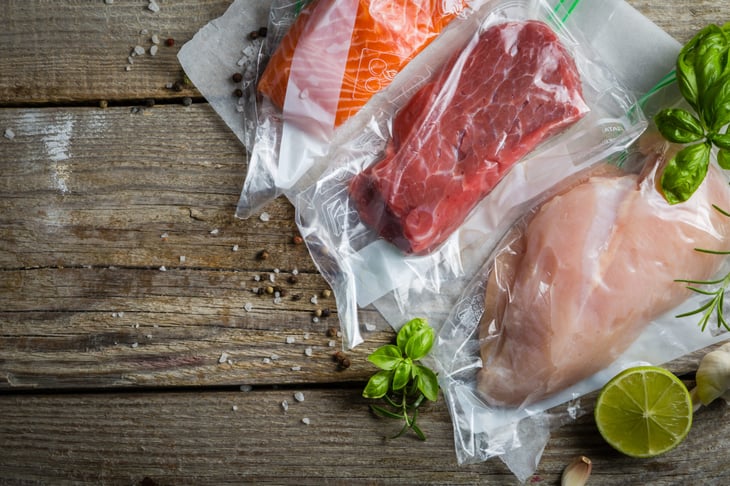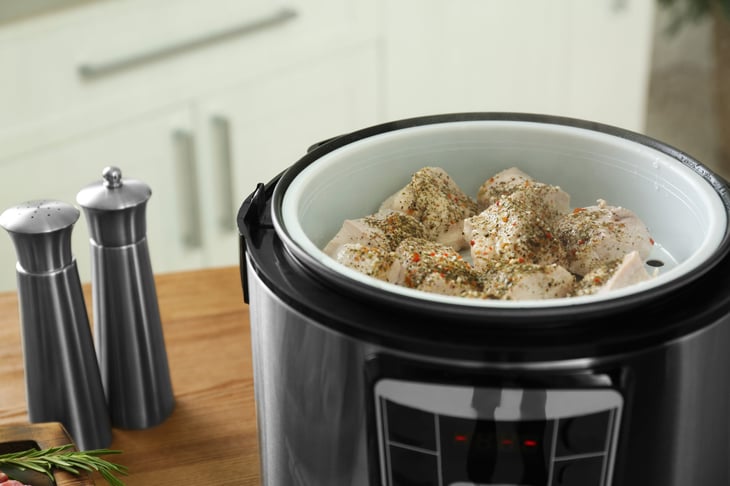
Editor’s Note: This story originally appeared on The Penny Hoarder.
Inflation is hitting everyone where it hurts — our wallets.
The cost of everyday essentials like food and gas is eroding away the buying power of everyday Americans. Paychecks don’t stretch as far. Grocery bills hurt more.
It can feel impossible to get ahead.
Money-saving tricks, both big and small, can make a difference.
If you’re looking to add some breathing room to your budget — despite 40-year high inflation — our top money-saving hacks can help.
1. Ask What Day Your Grocery Store Marks Down Items

Grocery stores usually discount items that are close to expiring on a specific day of the week. Asking a store associate what day and time they mark down items is a super savvy way to score discounted meats, bread and veggies.
2. Skip Grocery Delivery and Go With Pickup Instead

Grocery delivery is incredibly convenient — and expensive. Tips and fees on an Instacart order can easily add $20 to $30 to your grocery bill.
If you’re trying to break the grocery delivery price trap, try pickup instead.
Opting for grocery curbside pickup is a much cheaper alternative that’s still fast and easy. It’s also a smart way to stick to your grocery list because you won’t be tempted to buy random extras in the store.
It’s also often easier to find the cheapest price per unit if you can see all available products on a single page instead of scouring the shelves.
Lots of stores offer free or very cheap pickup options, including BJ’s Wholesale Club, Aldi, Kroger, Target, Albertsons and Walmart.
3. Buy Frozen and Canned Vegetables and Fruits

Frozen and canned goods last longer, have similar nutritional value as fresh produce and cost much less.
“Buying things like broccoli, carrots, peas and cauliflower frozen or canned is the best way to get a longer shelf life and reduce food waste,” said Jessica Ayala, a full-time banquet chef in Orlando, Florida. “Be honest about the fresh foods you’ll actually eat in a reasonable amount of time.”
4. Buy Meat on Sale in Bulk and Freeze It

Pricey cuts have penny pinchers across the country ditching meat. Going meatless a day or two a week and turning to cheaper alternatives, like beans and lentils, can be a great way to cut costs.
Think about eggs, too. There are dozens of affordable dinner ideas starring eggs.
If you aren’t quite ready to give up your carnivorous ways, look for larger sizes of meat (think 3 pounds or more of ground beef, family packs of chicken breasts) to go on sale.
Buy a couple packages at a time, break them down into 1-pound packages and freeze them.
5. Meal Prep (Seriously, at Least a Little)

Meal prepping doesn’t need to be labor intensive and scary. Here’s how to start meal prepping so you’ll actually stick with it.
6. Watch for Holiday Sales

Keep an eye out for holiday deals — like when canned beans go on sale for Cinco de Mayo or BBQ sauces for the Fourth of July.
Load up on discount candy the day after holidays like Valentine’s Day, Easter and Halloween.
While you’re at it, check out our month-by-month guide on the best time to buy almost everything, like computers in August and swimsuits in September.
While you’re at it, check out our website to see the best time to buy almost everything, like computers in August and swimsuits in September.
7. Avoid Drinking Your Money

Drink water instead of buying soda or juice. Nix the bottled water and go with filtered water or tap instead. Make coffee at home instead of grabbing Starbucks.
Make an alcohol budget and stick to it — or ditch the booze entirely if you want to save big bucks.
8. Buy (Certain Things) in Bulk at Warehouse Clubs

Buying everyday essentials in bulk is a solid way to save money. Just make sure to shop smart if you’re buying in bulk.
While it can be tough to fork out membership fees to warehouse clubs like Costco and Sam’s Club, some offer specials that allow you to join at a lower price. Check Groupon and other coupon sites to score a cheaper annual membership.
You can also try online bulk suppliers like Boxed, which delivers orders to your door without charging annual membership fees.
9. Shop Seasonally

The best way to save money on fresh produce is to buy fruits and vegetables when they’re in season.
Here is a list of when different produce is in season across the U.S.
10. Serve Smaller Portions

Serve dinner in smaller portions on smaller plates. It makes you more aware of what you’re eating and less likely to throw away scraps of uneaten food. It’s also better for your waistline.
11. Check High and Low on the Grocery Shelves

Next time you go to the grocery store, check the top and bottom shelves. Grocery stores know that most people only look at the middle area, so that’s where more expensive items tend to be.
12. Check the Cost per Unit Price

Each item at the grocery store has a corresponding tag on the shelf. In the top left or right corner, you’ll find the “cost per unit price.” This is the best way to truly compare prices, especially when buying in bulk.
13. Check Out Local Food Pantries

Asking for help can be hard, but food pantries provide a legitimate way to get food for free. If you’ve experienced a job loss or change in income, it makes sense to contact your local food pantry to see what’s available instead of going hungry or taking on debt.
You can use this food pantry locator tool from Feeding America to find food banks in your area.
You can also call United Way’s 211 service to find other local resources.
14. Freeze Your Bread

Bread will get moldy, like surprisingly moldy in no time during the summer.
“Kitchens and restaurants use this trick everyday to reduce food waste and save money,” Ayala said.
From hot dog buns to whole multigrain loafs, you can prolong the shelf life of bread by as much as four to six months by freezing it.
Another great bread hack?
“Crush up stale crusty bread, add some seasoning and make your own bread crumbs you can cook with later,” Ayala suggested.
15. Embrace That Crock-Pot Life

If you’re trying to feed a family, cooking in bulk with a slow cooker can save you tons of money and time.
Making big batches of soup — and freezing some for later — is also a good way to utilize things in your kitchen before they go bad. (Remember: Try to extend the shelf life of everything in your kitchen.)
16. Purchase Versatile Ingredients

For example, pick a protein like chicken and learn to prepare it in a way you like. One day you can pair the chicken with a salad, the next day add it to a rice and beans (or quinoa) bowl, and the next day chop the chicken into strips and add it to a cheese quesadilla.
Another option is steak and potatoes one night, steak fajitas another night and a steak and bean rice bowl another.
17. Eat the Same Thing for Breakfast Every Day

An easy breakfast staple, like oatmeal, can cost less than 10 cents a serving and you can change up the toppings.
Or for an even leaner budget, skip breakfast altogether if it works for your health and diet. You may even see some health benefits, according to intermittent fasting research.
18. Reorganize Your Fridge and Freezer

The average American household wastes about 31.9% of its food — a whopping $1,866 per household per year, according to a 2020 study published in the American Journal of Agricultural Economics.
We’ve all been guilty of it. Leftovers get shoved to the back of the fridge, veggies get gross in the crisper. We get it.
Going through your fridge — and pantry and freezer — is a great way to take inventory, so you’re not buying duplicates or letting good food go to waste.
While you’re at it, watch some videos on YouTube from professional organizers who offer low-cost ways to rearrange your fridge so food is more visible and accessible.
19. Check Out Fuel Reward Programs

Sign up for a gas company’s fuel rewards program, and that’ll save you money on frequent purchases at a given gas station. Many grocery stores’ fuel reward programs can also help you save.
20. Use Gas Discount Apps to Save at the Pump

Apps like Upside or GasBuddy can help you find the cheapest gas when it’s time to fuel up.
21. Pay for Gas in Cash

There’s other ways to save money on gas besides using gas rebate apps.
Some solid inflation hacks to save money on gas? Buy your gas in cash (many gas stations give you a discount), and check your tire pressure, since poorly inflated tires can affect gas mileage.
22. Consider Becoming a One-Car Household

It may sound extreme — but so are the savings.
No gas or car payment. No car insurance bill or new tires in the winter. No parking fees or tolls.
With Uber, Amazon same-day delivery, work from home jobs and telehealth visits here to stay, you may not need a second vehicle as much as you think.
And going down to a one-car household could literally save you thousands of dollars a year.
Explore public transportation options in your area and plan out errands with your partner.
And remember: Ditching your car isn’t a forever commitment. You can pocket the savings for a couple years, then reevaluate your budget in the future.
23. Cancel Your Car Insurance

Here’s the thing: your current car insurance company is probably overcharging you. But don’t waste your time hopping around to different insurance companies looking for a better deal.
Use a website called EverQuote to see all your options at once.
24. Save Money at the Airport

The truth is airline tickets are much more expensive than they were in 2020, and prices aren’t likely to come down anytime soon.
Certain budget airlines are still offering decent deals if you’re flexible on your schedule and destination — just keep an eye out for hefty baggage fees and other costs.
If you’re catching a flight, save money at the airport by bringing an empty water bottle and packing some snacks.
You can also rent out your car using apps like Turo and TravelCar to make some money while you’re away.
25. Start Walking and Biking

Using an e-bike is a super frugal — and healthy — way to save money on your daily commute, especially if you’re replacing a car.
Plus there are a surprising number of apps, like A Healthy Wage and Sweatcoin, that will pay you to exercise — a win-win.
26. Check Out Cash-Back and Rebate Apps

There’s lots of cash-back and rebate apps out there that can add some jingle to your budget. Many reward you for scanning your receipts while others deposit cash back to your account when you make a purchase at a participating store with a linked credit card.
There are also browser extensions like Capital One Shopping and coupon sites that can help you save money on everyday purchases.
27. Cut Back on Pet Expenses

You love your pet like family. But if your furbabies are draining your wallet, it’s time to cut back.
Learn how to save money on dog food (hint: buy in bulk or make your own) and explore other ways to save money on pet care. You could even start a pet sitting side hustle to bring in extra income.
28. Threaten to Break Up With Your Phone, Internet, Cable and Insurance Providers

Sometimes they’ll give you a lower rate to keep you as a customer. Try asking for the retention department when you call.
29. Be Smart About Your Streaming Services

Multiple streaming services can almost cost as much as a cable TV subscription.
To minimize the bite, take advantage of free trials and free TV apps.
Another smart way to save? Ask friends or family if they want to share streaming accounts. Set up profiles under a shared account and then Venmo or Cash App your friend an agreed-upon amount each month for sharing.
Just be careful: Some streaming services, like Netflix, are cracking down on sharing accounts.
30. Cancel Subscriptions and Non-Essential Memberships

Monthly subscriptions and memberships add up quickly. Five bucks here, $8 dollars there. Before you know it, you’re spending $80 a month on random subscriptions you may not really use.
Trying to cut costs fast? There are apps that help you manage your subscriptions — and some even help you cancel a subscription or negotiate better pricing.
31. See If You Qualify for Discounts Through This Federal Program

Millions of Americans now qualify for discounted internet access thanks to an expanded federal program called the Affordable Connectivity Program (ACP).
Qualifying households get a $30 monthly voucher toward their high-speed internet bill and a one-time $100 voucher to purchase a laptop or desktop computer.
Some internet providers are also offering discounted plans in collaboration with the ACP, which can help stack savings on savings.
There’s a couple ways to qualify. If you already receive Medicaid, a Federal Pell Grant (for the current award year), SNAP benefits, WIC, a veterans’ pension or survivors benefits — or one of these six other programs — then you qualify.
The other way to qualify is by your income: A single-person household can’t earn more than $27,180 a year (hello, college students and retirees), while a family of four can’t exceed $55,500 a year. It’s 200% of the federal poverty line.
It’s quick and easy to apply for an ACP voucher, and you can learn more about the program here.
32. Save on Date Nights and Still Have Fun

The cost of dinner and drinks is a real mood killer these days.
No one likes the idea of staying home after being cooped up for two years, but when times are tough, it makes sense to explore cheap date night ideas. (Playing sexy MadLibs with a bottle of cheap wine could be surprisingly entertaining.)
